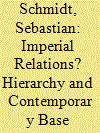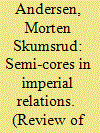|
|
|
Sort Order |
|
|
|
Items / Page
|
|
|
|
|
|
|
| Srl | Item |
| 1 |
ID:
164436


|
|
|
|
|
| Summary/Abstract |
What are the politics of, and prospects for, contemporary weapons control? Human rights and humanitarian activists and scholars celebrate the gains made in the UN Arms Trade Treaty as a step towards greater human security. Critics counter that the treaty represents an accommodation with global militarism. Taking the tensions between arms transfer control and militarism as my starting point, I argue that the negotiating process and eventual treaty text demonstrate competing modes of militarism. Expressed in terms of sovereignty, political economy, or human security, all three modes are underpinned by ongoing imperial relations: racial, gendered, and classed relations of asymmetry and hierarchy that persist despite formal sovereign equality. This means human security is a form of militarism rather than the antithesis of it. Drawing on primary sources from negotiations and participant observation with actors involved in the campaign for the ATT, the argument challenges the idea that human security has scored a victory over militarism. It also complicates our understanding of the nature of the accommodation with it, demonstrating the transformation as well as entrenchment of contemporary militarism. The argument reframes the challenges for controlling weapons circulation, placing the necessity for feminist, postcolonial anti-militarist critique front and centre.
|
|
|
|
|
|
|
|
|
|
|
|
|
|
|
|
| 2 |
ID:
188896


|
|
|
|
|
| Summary/Abstract |
The prevailing assumption in discussions of foreign military basing is that such presences are hierarchical in nature. Though this was unavoidably the case prior to the Second World War, changes in the normative framework of international politics mean that such presences’ relationship to hierarchy has become an empirical question. Specifically, changes in sovereignty norms and the emergence of territorial and jurisdictional integrity render the linkage between foreign military basing and hierarchy contingent. As a result, some basing arrangements’ dynamics now closely resemble those of other interstate agreements. This analysis regrounds hierarchy in the specific normative context of action and in doing so highlights the implicit reification of the state in contemporary security studies. In practical terms, it shows how assuming hierarchy both overestimates the fragility of the US basing network and, by exaggerating authority relations, obscures the potential for greater fluidity in the basing space.
|
|
|
|
|
|
|
|
|
|
|
|
|
|
|
|
| 3 |
ID:
144053


|
|
|
|
|
| Summary/Abstract |
Recently, the field of International Relations has seen increased interest in international hierarchy, and also an upswing in the analytical study of imperial logics of rule. Nonetheless, existing structural models of empire focus on core-periphery dynamics, and so cannot explain polities that display elements of both core and periphery. Therefore, I offer the new concept of ‘semi-cores’. Semi-cores are a specific form of historical political associations whereby certain imperial provinces are different from the others in terms of the close relationships it maintains with the imperial metropolis. Semi-cores are different by virtue of being relatively similar. The conceptualisation of semi-cores is followed by a section illustrating its logic, examining the relatively unfamiliar cases of Scotland and Norway and their position within the Danish and British empires, respectively. Although being separate imperial provinces, these were tightly connected to an imperial core. This concept helps us better understand imperial logics, and in the process shows how cultural factors can be formalised into accounts of structural logics of rule, impacting our understanding of both historical and contemporary hierarchical international affairs.
|
|
|
|
|
|
|
|
|
|
|
|
|
|
|
|
| 4 |
ID:
105006


|
|
|
|
|
| Publication |
2011.
|
| Summary/Abstract |
Small arms feature prominently on the post-Cold War international security agenda as the common factor in a range of forms of organized violence. The dominant mode of understanding is focused on human security and the links between conflict, security and development. Yet small arms control efforts are failing to live up to their promise. In attempting to remedy this, scholars argue that small arms control requires better conceptualization and operationalization. This article engages with the conceptualization of small arms control, arguing that small arms control serves to reproduce imperial relations in a number of ways. It is characterized by four key analytical themes - the blurring of the distinction between state, non-state and civilian actors; the increasingly fuzzy line between conflict and crime; the pacific nature of development; and the desirability of a Weberian monopoly on violence - that are derived from an idealized reading of the European historical experience and applied to the contemporary South. This conceptual Eurocentrism is furthered by the exclusion of wider questions of the world military order and militarism through a geographical and technological selectivity and the absence of a single analytical frame, as well as North-South hierarchies in the institutional formation of policymaking. Overall, small arms control serves to reproduce the South as a site of benevolent Northern intervention, contributing to the mutual constitution of both.
|
|
|
|
|
|
|
|
|
|
|
|
|
|
|
|
|
|
|
|
|